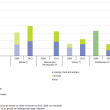In Focus of WBC-RTI.INFO: Women in Science | Gender Equality
29. Jun. 2016
Gender inequalities in research and innovation persist; attrition continues to exist at higher levels of a scientific career..
The latest “She Figures 2015” publication shows that gender inequalities in research and innovation persist; it shows further that some progress has been made, although attrition continues to exist at higher levels of a scientific career. The most recent data indicate that women made up 47% of PhD graduates in the EU (EU-28), but made up only 33% of researchers and 21% of top-level researchers (grade A). It is even lower at the level of heads of institutions with a mere 20 %. These figures show that only limited progress has been made since 2011.
For the Western Balkan countries a comprehensive analysis related to women in science is not possible due to lack of data. Based on data available in Eurostat as of Sept. 2015, analysis of R & D personnel by sex shows that women accounted for 51 % of the workforce in Serbia in 2011 and Montenegro in 2013, and a higher majority (57 %) in the former Yugoslav Republic of Macedonia in 2012. By contrast, women were in a minority among R & D personnel in Bosnia and Herzegovina (42 %). Update is expected in October 2016. No data are available for Albania and Kosovo.
Nevertheless some observations (for Macedonia, Montenegro and Serbia) are made by the “She figures 2015” team and are summarised in this article. For example that only in the former Yugoslav Republic of Macedonia, Latvia and Lithuania women researchers represent more than 50 % of researchers across all sectors of the economy; or that the proportion of women researchers is the lowest in the agricultural sciences, with the exception of Serbia. It is also interesting to note that across the various fields, women researchers are most likely to work in the social sciences in 13 out of 31 countries and in the medical sciences in 12 out of 31 countries. This is the case for natural sciences in only two countries (Estonia and Italy), and for engineering and technology in only three countries (Croatia, Greece and Romania). For detailed information and methodological constraints please consult the “She Figures” handbook and report.
In addition, WBC-RTI.info asked young women scientists / project manager in Bosnia and Herzegovina for their opinion on national R&I sector and their experiences so far as a researcher / project manager. We spoke with Maja Arslanagić-Kalajdžić, PhD and Selma Kadic-Maglajlic PhD, both Assistant Professors at the School of Economics and Business, University of Sarajevo (SEBS). The interviews were conducted by Ines Marinkovic (ZSI) and are published at WBC-RTI.info.
In essence, it is less a “gender issue” that our interview partners identified as a huge challenge for research and innovation in the country or at the institutional level of their respective organisation. They see the reasons for stagnation / obstacles / challenges in research and innovation sector somewhere else. Namely, they spot more challenges for further development of research and innovation sector related to e.g. the complex organisation of the country or the role that R&I plays on the national level (declarative vs. practice) or missing managerial and administrative capacities across the country which are vital for e.g. improvement of the success rate in Horizon 2020 and other research funding programmes. (...)
The full article is available at WBC-RTI.info website.
Related Articles:
- Project: Information Platform | Western Balkan Countries | Research, Technology, Innovation
- News: WBC-RTI.info to support integration of WBC into ERA for the next 3 years
- Event: Engaging Science with and for Youth
Tags: Balkan, gender, Southeast Europe















































